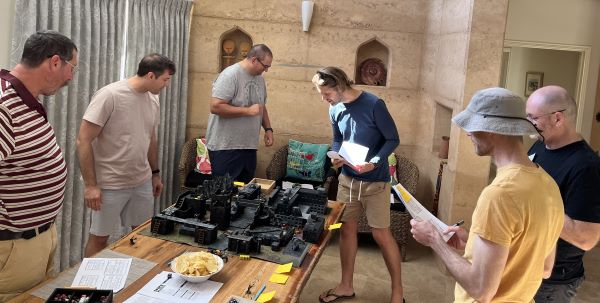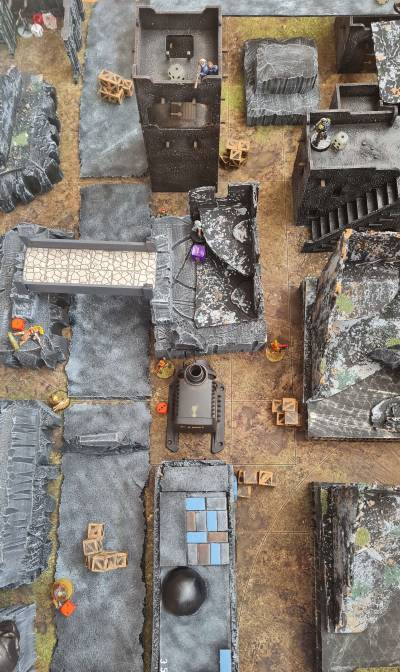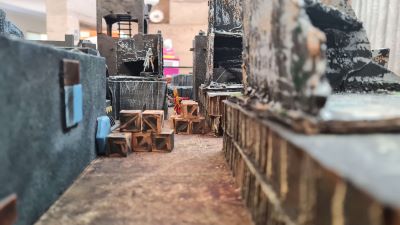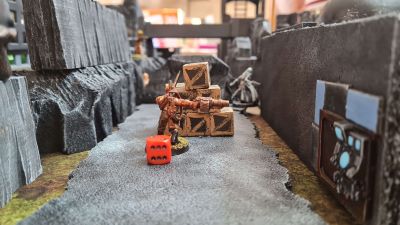I’ve been working on the idea of a roleplaying game that can be used for leadership development for a while now. My first attempts can be found in my Play2Lead ruleset. During playtesting the rules definitely work as intended. Now all that is needed are some scenarios that focus on specific leadership lessons. There are so many themes to choose from it was difficult to work out which to use. However, the more I thought about it the more collaboration bubbled to the surface. Every successful team, business and leader thrive on collaboration. Therefore this adventure scenario focuses on exactly that.
Design Principles
For a game to work in the leadership development setting I believe it should attempt to fit within the following principles:
- Easily identifiable. Players who don’t like or understand fantasy should be able to relate to the setting and themes of the adventure
- Playable in a lunch break. Maximum play time of 1.5 hours, though ideally within 1 hour
- Playable for 4-6 participants excluding the gamemaster
- Have a clear objective
- Start in the action immediately
- Apply pressure throughout, forcing fast tense decision making
- Focus heavily on the leadership lesson. In this instance “collaboration”.
Given the short playing time I have designed the scenario around the following timeline:
- Introduction, explanation of rules and choosing of roles – 10 mins
- Encounter 1 – straight into the action – 15 mins
- Encounter 2 – problem solving – 15 mins
- Encounter 3 – explosive finale – 15 mins
- Wrap up and debrief – 10-20mins
Adventure Introduction
In the heart of the dense jungle lies the ruins of an ancient temple, rumored to hold untold riches and artifacts of great power. However, the temple is also said to be filled with traps and puzzles designed to test the wit and cooperation of those who dare to enter.
A group of treasure hunters have funded an expedition to the temple in the hope of uncovering it’s wonders to share with the world. The architects of this ancient place were cunning beyond measure, and the team will soon discover that their greatest challenge will be working together to make it out alive.
For inspiration think Indiana Jones, Tomb Raider, Unchartered and Jungle Cruise.
Player Set Up with Collaboration in Mind
Using the Play2Lead ruleset all players need is an occupation. For this adventure they can choose from:
- Archaeologist – professor of the ancient world. Equipped with a lantern. Read hieroglyphics, understand artefacts, high level of knowledge
- Climber – working at heights professional. Equipped with a 50m rope. Climbing, ropework, high level of agility
- Engineer – technical specialist. Equipped with a shovel and axe. Construction, demolition, high level of practical know how
- Navigator – directional expert. Equipped with a compass. Map and compass skills, unerring sense of direction
- Pilot – helicopter pilot. Equipped with a lantern. Piloting vehicles of all types, radio use, electronics master
- Expedition Leader (optional) – no specialist skills. Equipped with a knife. Must facilitate the team working together
To speed things up have a character sheet for each character type ready to go.

#1 Collapsing Chamber
We begin in the treasure room of the Lost Temple. A chamber adorned with intricate carvings, hieroglyphics and ancient relics. Piles of gold and gems lie strewn along the walls. Timber shelves lie broken on the floor. On a roughly hewn plinth sits the fabled statue of the gods glinting in the torchlight. Pick a player at random. That characters hand has just closed around the ancient artefact. Suddenly, they trigger a hidden mechanism, causing the chamber to shake violently as the ceiling starts to collapse. Large stone blocks begin to fall from above, blocking the exit. Gold coins rain from the ceiling filling the chamber and restricting movement.
Challenge: The party must quickly assess the situation and find a way to escape before they’re crushed by falling debris.
Solution: A hidden lever is located up one of the walls. Reading the hieroglyphics will point out it’s location. Otherwise careful observation might allow it to be found. Pulling the lever stops the collapse and reveals a new passage to safety. Alternatively, the party could use their strength and agility to dodge falling rocks and clear a path to the exit.
Remember this is a high pressure situation. Make players take Exhaustion (Play2Lead) or other Pressure Tests if using another system to ratchet up the tension. Don’t give the players too much time to plan. If an individual is taking too much time skip them and move on. Pushing the time threat is a critical part of this encounter.

#2 River Rapids
Exiting the collapsing chamber, the group of adventurers find themselves in a vast underground river that flows through the heart of the temple. The river’s currents are swift and treacherous, and the only means of escape seems to be an old rickety raft tethered to the shore.
Challenge: Maneuvering the raft through the river’s rapids while avoiding jagged rocks and hidden dangers.
Solution: The party must work together first to make the raft river worthy. Not doing this will give it a chance to break up halfway through the encounter. Secondly, to navigate the river, using their skills to steer the raft safely. The river will fork. The navigator will be able to tell which way to go. Alternatively there is a fresher breeze coming from the right channel. Along the way, they encounter a series of jagged rocks that threaten to damage and capsize the raft.
Reward player ingenuity here. What will they use to steer the raft? How will they make it safe to use?
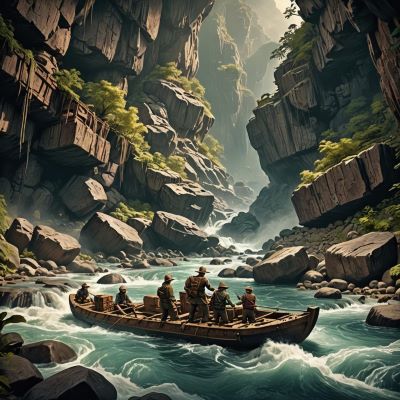
#3 Guardian’s Gauntlet
The river throws the group from a low waterfall into a pool below. The bright sunlight of the jungle pool meets them as they find themselves out of the temple. However, as they swim to the side something slides against the leg of one of the swimmers. They are not alone.
Within the pool lives a formidable guardian—a massive, serpentine creature with gleaming scales and razor-sharp fangs. Blocking their path, the guardian seems intent on preventing anyone from leaving the temple alive. It will attempt to encircle the character that is most alone and attempt drown it. One bite from this creature will kill a character outright. This should be played as a deadly, exciting grand finale to the adventure.
Challenge: Defeating or evading the guardian while making a desperate dash for freedom.
Solution: The party must use their wits to outmaneuver the guardian, perhaps by exploiting its weaknesses or finding a way to distract it long enough to slip past. Alternatively, they could way to incapacitate it temporarily, allowing them to make their escape without resorting to violence.
Heighten the terror by having the creature signal it’s presence. Slithering past a leg. Ripples on the water. A flick of a slimy, scaly tail. When the creature reveals itself play up the danger, the toothy maw, the crazed eyes. Make sure the payers know that their characters are in trouble.
Once again reward out of the box thinking and collaboration. How will the team distract or defeat the creature together. This is not something they can win alone.

Collaboration Debrief
Did the players escape unscathed? While the adventure is over, the experience is not. Now is the time to get your players reflecting upon their experience. Ask some or all of the following questions to draw out the discussion.
- Where did you as a team collaborate well?
- Did you utilize everyone’s skills?
- How could you have integrated collaboration better?
- Is there anything you would have done better?
Following the debrief it’s also worth asking your players for feedback. Did they enjoy the experience and was there anything that could have been done better?
Final Thoughts on an Adventure in Collaboration
This adventure aims to be a fast, exciting experience that fosters collaboration between the players. A chance to debrief afterwards gives attendees a chance to reflect on their experience and what went well and what didn’t.
I envisage this as a useful experience for a cohort of a future leaders training course. Run this experience at the beginning of the course. Then, follow up with a similar experience at the end and see how they have grown as leaders. Has their level of collaboration increased?
Alternatively it could be used as a way help a newly forming team. A chance to get to know each other in a fun experience as well as reflect on how they might work together moving forward. Other uses might be as a way to introduce new people to world of rpgs. A small commitment of time as a way to dip their toes into this exciting medium.
I hope this simple scenario opens your eyes to what can be done with a short, simple adventure. Where do you think it could be used?
A pdf of this adventure with character sheets can be found at the Play to Lead downloads page.


